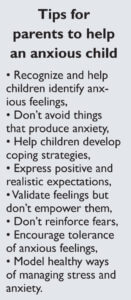By SARAH DOOLITTLE, Four Points News
Anxiety disorders are affecting millions of children in the United States, including a number of young people in Four Points, according to Shelley Coleman, a licensed professional counselor and supervisor with a practice in Lakeway.
Coleman’s been working with children and adolescents for ten years and since opening her Lakeway practice has seen an increase in patients dealing with anxiety.
“It keeps coming up,” said Coleman, who spoke to parents at Canyon Ridge Middle School about children and anxiety earlier this year.
“Anxiety disorder” is a general term, as defined by the DSM-5 (the newest edition of the Diagnostic and Statistical Manual of Mental Disorders), and can be expressed as one or more specific forms of anxiety, such as separation anxiety, social anxiety, a panic disorder, agoraphobia or a generalized anxiety disorder.
A community of overscheduled kids
As a Four Points area parent herself, Coleman knows firsthand the temptations of living in a highly educated, affluent community that offers endless opportunities to its children, with the best of intentions.
“I have a fifth grader and I don’t know what she wants to do with the rest of her life, so I want to expose her to a lot of things. Sports or art or academic. And normally I just don’t think people have this many choices,” Coleman said.
“Also, there’s the pressure from the schools, because there are so many classes and pre-AP classes. And our schools are huge. And the kids that want to go to UT have to be in the top seven percent. It doesn’t just mean making straight As anymore. It means making As in your AP classes. And your club sport. And your volunteer hours. And you’ve got to show that you’re well-rounded,” she added.
None of this comes without a price. Coleman also sees at home and in her practice the stress and anxiety that over-scheduling can create in a developing brain.
“There’s no time for sleep. There’s no time to connect with your family. There’s no downtime. Ever. It’s like you almost have to schedule the downtime,” she said.
“We know now that the brain is developing until you’re 24 or 25… I think as parents we have to start to recognize — whether middle school, high school — okay, what can our child manage? Because every child is different. Some kids can manage five AP classes and a club sport. Some kids cannot.”
“Find time for the downtime.”
When a parent recognizes that their child may be overloaded, it’s an opportunity to, “take a step back and help them prioritize. And then give them some coping skills to manage the stress. Find time for the downtime. Think about what’s important to your family,” whether it’s sport, academics, extracurriculars — or fewer activities when necessary.
The question of how and when to say “no” to a child who wants to participate in more activities than a parent feels is appropriate is a hard one to answer, even for the professionals.
“That’s the million dollar question. If there were a definitive answer that fit everybody, I could write the book and sell that. I’d be very wealthy. But there’s not, because all kids are different,” Coleman said. “So you have to recognize, when is this becoming a problem? What symptoms am I seeing?”
Coleman reminds parents that there are non-negotiable factors necessary for a child or even an adult to function well, especially in a high-stress environment. Adequate sleep, appropriate nutrition, friendships and and time with family can be used as measures of whether or not a child is maintaining a realistic schedule.
“I think you just have to look at the whole picture. And then if you feel like those things are suffering, as a parent it’s just like anything else. You have to step in and say, okay, we have to make some changes.”
“You know as a parent what they need. And whether they’re getting that thing that they need.”
Toleration vs. elimination
Coleman emphasizes that none of this is to say that parents should try to eliminate anxiety from their children’s lives. She reminds parents that anxiety is a normal human emotion and an appropriate response to stress.
Instead of trying to avoid it, “We need to learn to label it and to tolerate it,” she said, as well as to learn ways to manage stress and anxiety.
“Any times are kids are uncomfortable (emotionally), we tell them, ‘Don’t feel that way!’ It’s okay to be anxious and to learn that, you know, I feel anxious right now… and sit with it. Our kids can tolerate that, to a degree,” she said.
When that degree is exceeded is the point at which parents need to ask themselves whether there is call for for additional coping skills and resources.
To start, parents can ask themselves key questions: Does my child’s anxiety keep him or her from doing something they would normally want to do? How intense are their anxiety symptoms, and how long do the symptoms persist?
For parents unsure how to measure the extent of a child’s anxiety, Coleman encourages seeking professional help. She says most therapist will provide a free phone consultation to help determine whether or not help is needed beyond what parents can provide at home.
The adults a child sees every day at school can also be enlisted to help manage a student’s stress. “Because they want the best out of your child, too. Sometimes it’s just communication with the coach or the teacher to say, ‘This isn’t working. Here’s some thoughts. What can we do at home to support you,” Coleman said.
Furthermore, small and simple efforts can help to manage or disrupt feelings of anxiety, such as offering to help with chores, taking a break from schoolwork to do something fun, going for a walk or even just going to bed earlier than usual.
Parents, who may also be managing their own stress and over-scheduling, can benefit from all the same behaviors in addition to modeling healthy coping skills.
Coleman wants to remind parents that, while they can’t always control the pressures and expectations to which their kids are subjected, “We can as parents do a lot of other things. We can help our kids say, okay, what are the most important things? Let’s set some priorities. You’ve got to learn what you can balance.”


